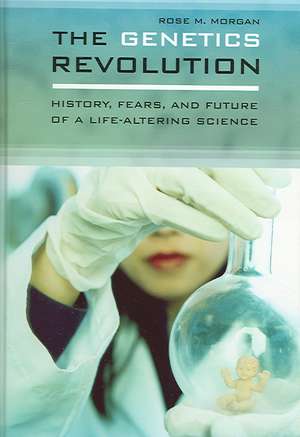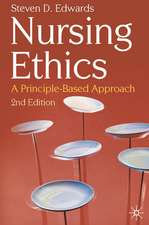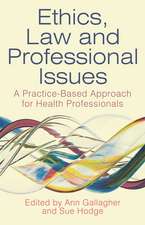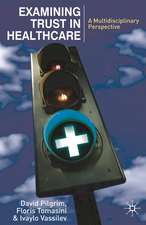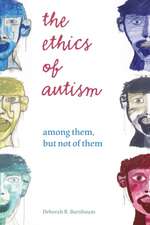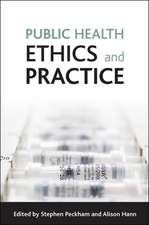The Genetics Revolution: History, Fears, and Future of a Life-Altering Science
Autor Rose Morganen Limba Engleză Hardback – 29 noi 2005 – vârsta până la 17 ani
Preț: 230.57 lei
Preț vechi: 393.62 lei
-41% Nou
Puncte Express: 346
Preț estimativ în valută:
44.12€ • 48.07$ • 37.18£
44.12€ • 48.07$ • 37.18£
Carte tipărită la comandă
Livrare economică 23 aprilie-07 mai
Preluare comenzi: 021 569.72.76
Specificații
ISBN-13: 9780313336720
ISBN-10: 0313336725
Pagini: 232
Dimensiuni: 178 x 254 x 20 mm
Greutate: 0.65 kg
Editura: Bloomsbury Publishing
Colecția Greenwood
Locul publicării:New York, United States
ISBN-10: 0313336725
Pagini: 232
Dimensiuni: 178 x 254 x 20 mm
Greutate: 0.65 kg
Editura: Bloomsbury Publishing
Colecția Greenwood
Locul publicării:New York, United States
Notă biografică
Rose M. Morgan, PhD, is professor emerita of biology at Minot State University. She has published over 50 articles in refereed national and international scientific journals, as well as several other books. She is listed in Who's Who in Science and Engineering, Who's Who in Medicine and Healthcare, and Who's Who in America. Currently, she is an independent scholar.
Cuprins
PrefaceOn the Brink of Altering LifeRecombining DNA MoleculesSplicing Life: Technological Revolution or Pandora's Box?The Book of Life: The Human Genome ProjectBeauty and the BeastLaboratory Babies: New Biology, New MoralityThe Warnock ReportFighting to Save a Gene PoolThe Human Genome Diversity ProjectThe HGDP DebateThreading an Ethical NeedleStem Cell ResearchA Major DecisionTo Clone or Not to Clone: That is the QuestionReproductive CloningCloning a HumanEnd NotesBibliography
Recenzii
Over the past 35 years, the field of genetics has been inundated with new discoveries, capturing worldwide attention. In The Genetics Revolution, Morgan addresses the intriguing research on recombinant DNA technology, in vitro fertilization, the human genome diversity project, stem cell research, and cloning. The book is divided into five sections: On the Brink of Altering Life, Beauty and the Beast, Fighting to Save a Gene Pool, Threading an Ethical Needle, and To Clone or Not to Clone: That Is the Question. The author describes hallmark genetic discoveries to frame each research topic in a historical perspective without belaboring the genetic experimental protocols. In addition, the book presents the merits of all the research areas and their potential benefit to society. Finally, it considers ethical, moral, legal, and political issues. Recommended. Upper-division undergraduates and above.
The one topic that will probably be most useful for high school students is the recounting of the problems involved with the Human Genome Diversity Project. It is a topic in which the available information is sparse, but one that primarily involves sociology and anthropology aid is meaningful without an understanding of DNA sequencing.
To consider the future of genetic research, Morgan clarifies its history and examines five major research areas: the Human Genome Project and genetic engineering; in vitro fertilization and the technology of reproduction; the Human Genome Diversity Project; embryonic stem-cell research; and cloning. She also examines the scientific, social and political impacts of genetics on everyday life.
The one topic that will probably be most useful for high school students is the recounting of the problems involved with the Human Genome Diversity Project. It is a topic in which the available information is sparse, but one that primarily involves sociology and anthropology aid is meaningful without an understanding of DNA sequencing.
To consider the future of genetic research, Morgan clarifies its history and examines five major research areas: the Human Genome Project and genetic engineering; in vitro fertilization and the technology of reproduction; the Human Genome Diversity Project; embryonic stem-cell research; and cloning. She also examines the scientific, social and political impacts of genetics on everyday life.
